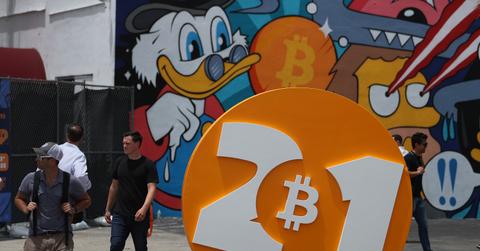Wash Trading in Cryptocurrency: Illegal but Still Common
Wash trading is widely regarded as an illegal type of trading, but many trading companies and crypto exchanges practice it.
Sept. 29 2021, Published 6:07 a.m. ET

Cryptocurrency offers a way for people to participate in lending, purchasing, selling, and other activities without having a governing body control transactions. But what if the majority of transactions we see on crypto exchanges aren’t real? This is happening as a result of wash trading, a common practice in cryptocurrency that many retail investors aren't aware of.
Meme stocks and tokens have seen high trading volumes in 2021. Some retail traders have taken advantage of the volatility, profiting off of investments, trading options, and other routes. However, it’s possible that a lot of those trading volumes were the result of wash trading.
What is wash trading?
Wash trading is an illegal practice that's common for stocks, crypto, and other types of assets. It involves placing buy and sell orders with the intention of manipulating the market. One example could be a crypto exchange executing buy and sell orders in order to show that its platform has high trading volume, enticing people to join. The trading can be done by a trader, brokerage, or exchange.

There’s a variety of ways someone could profit off of wash trading. A trader can earn commissions or rebates for placing a certain number of trades or creating liquidity in an asset. In some instances, exchanges may reach out to traders and public and private investors to provide liquidity for their token or platform.
Private investors can significantly impact the market and profit if they take part in wash trading. This is because private investors tend to hold significantly more shares or tokens than retail investors, so their activity in the market can drastically increase trading volumes.
It has been widely speculated that most crypto exchanges take part in wash trading, especially decentralized exchanges. Bitwise, the world’s largest crypto index fund manager, reported to the SEC in 2019 that 95 percent of trading volumes on unregulated exchanges were “fake or non-economic in nature.” And Bitwise isn’t the only entity to make such claims about wash trading in crypto—there has been speculation over the years that volumes for certain tokens and platforms appear bloated.
The SEC charged two retail traders for fraudulent trading
On Sep. 29, the SEC charged two people for concocting a fraudulent scheme where they collected liquidity rebates using wash trading. The SEC stated in a press release that by using market maker accounts, Suyun Gu and Yong Lee would place orders on meme stocks such as AMC and GameStop, and in return, earn rebates for those orders. They would then use a market taker account to place trades going against the original orders, with no fees being charged.
By earning rebates on one side and then not being charged fees on the other, the men are estimated to have collected more than $1.5 million in rebates through the scheme. The SEC alleges that Gu executed approximately 11,400 trades with himself, netting at least $660,000 in the form of liquidity rebates. Meanwhile, Lee executed around 2,300 trades, netting at least $51,000 in rebates. Even though trading platforms weren't specified, it’s plausible the Florida men were using Robinhood.
